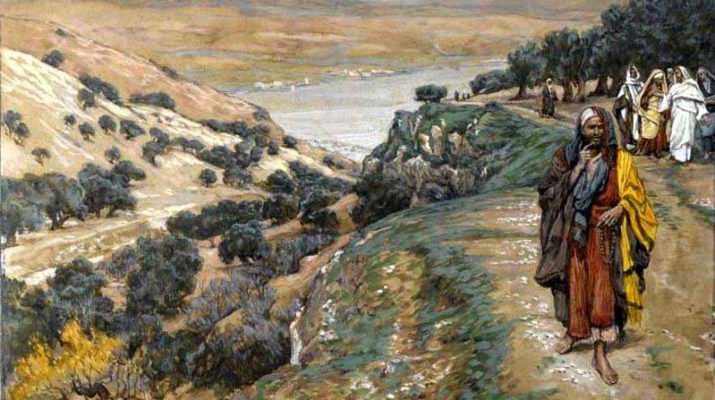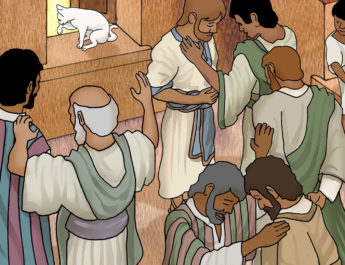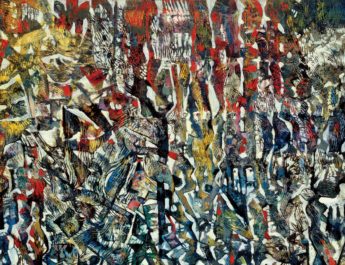Mark 10:17-31
Ordinary B46
17 As he was setting outA on a journey,B a manC ran upD and knelt beforeE him, and askedF him,
A “setting out” = ekporeuomai. From ek (from, from out of) + poreuomai (to go, travel, journey, die; refers to transporting things from one place to another; focuses on the personal significance of the destination); {from poros (passageway)}. This is to go forth, depart from, be spoken, flow out, project. This word emphasizes the result a process or passage – how it impacts the person or thing.
B “journey” = hodos. This is way, road, path, or journey. It can imply progress along a route.
C “a man” = heis. This is one, a person, only, some.
D “ran up” = prostrecho. 3x in NT. From pros (at, to, toward, with) + trecho (to run, make progress, rush; running like an athlete in a race; figuratively, to work quickly towards a goal in a focused way). This is to run towards in order to join.
E “knelt before” = gonupeteo. 4x in NT. From gonu (knee) + pipto (to fall in a literal or figurative sense). This is to kneel or bow for supplication or entreaty.
F “asked” = eperotao. From epi (on, upon, against, what is fitting) + erotao (asking a question or making an earnest request; used when one anticipates special consideration for their request); {from eromai (to ask) OR from ereo (to say, tell, call, speak of)}. This is to question, interrogate, seek, or demand. The questioner is at an advantage – in a preferred position when they make their question.
“GoodG Teacher,H what must I doI to inheritJ eternalK life?”L
G “good” = agathos. This is good, a benefit, or a good thing. It is good by its very nature, intrinsically good. A different word, kalos, refers to external signs of goodness.
H “Teacher” = Didaskalos. From didasko (to teach, direct, instruct, or impart knowledge; in the New Testament, almost always used for teaching scripture); from dao (to learn). This is teacher or master.
I “do” = poieo. This is to make, do, act, construct, abide, or cause.
J “inherit” = kleronomeo. 18x in NT. From kleronomos (heir); {from kleros (lot, portion, heritage; that share assigned to you; also a lot used to determine something by fate, chance, or divine will); {perhaps from klero (casting a lot) or from klao (to break in pieces as one breaks bread)} + the same as nomos (what is assigned – usage, law, custom, principle; used for the law in general or of God’s law; sometimes used to refer to the first five books of the Bible or the entire Old Testament; also used to refer to theology or the practice and tradition of interpreting and implementing the law of God); {from nemo (to parcel out, assign)}}. This is to acquire or get by inheriting.
K “eternal” = ainoios. From aion (an age, length of time). This is age-long, forever, everlasting. Properly, that which lasts for an age. This is where eon comes from.
L “life” = zoe. From zao (to live, be alive). This is life including the vitality of humans, plants, and animals – it is life physical and spiritual and life everlasting.
18 JesusM said to him, “Why do you callN me good? No one is good but GodO alone.P
M “Jesus” = Iesous. From Hebrew Yehoshua (Joshua, the Lord is salvation); {from YHVH (proper name of the God of Israel; the self-existent and eternal one); {from havah (to become) or from hayah (to come to pass, become, be)} + yasha (to deliver, defend, help, preserve, rescue; properly, to be open, wide or free, which implies being safe. So, in a causative sense, this is to free someone)}. This is Jesus or Joshua in Greek – the Lord saves or the Lord is salvation.
N “call” = lego. This is to speak, say, name, call, command. It is generally to convey verbally.
O “God” = Theos. From Proto-Indo-European origins, meaning do, put, place. This is God or a god in general.
P “alone” = heis. Same as “a man” in v17. See note C above.
19 You knowQ the commandments:R ‘You shall not murder;S You shall not commit adultery;T You shall not steal;U
Q “know” = eido. This is to know, consider perceive, appreciate, behold, or remember. It means seeing with one’s eyes, but also figuratively, it means perceiving – seeing that becomes understanding. So, by implication, this means knowing or being aware.
R “commandments” = entole. From entellomai (to charge, command, give orders or instructions) {from en (in, on, at, by, with) + tellomai (to accomplish); {from telos (an end, aim, purpose, completion, end goal, consummation, tax; going through the steps to complete a stage or phase and then moving on to the next one)}}. This is an order, command, ordinance, or law. It focuses on the purpose of the command and its end result.
S “murder” = phoneuo. 12x in NT. From phoneus (a murderer); from phonos (killing, murder, or slaughter; one of the crimes that Barabbas and Saul are accused of); from pheno (to slay). This is to kill or murder. It is killing on purpose without justification.
T “commit adultery” = moicheuo. 15x in NT. From moichos (adulterer; a man who has been with a married woman; used figuratively of an apostate). This is committing adultery or adultery itself. Used of a man with a married woman or a married man with anyone other than his wife.
U “steal” = klepto. 13x in NT. This is to steal by stealth – not in the open or using violence.
You shall not bear false witness;V You shall not defraud;W HonorX your fatherY and mother.’”
V “bear false witness” = psuedomartureo. 5x in NT. From pseudomartus (false witness); {from pseudes (false, lying, wicked); {from pseudomai (to lie, deceive, falsify)}} + martus (a witness whether having heard or seen something; witness literally, judicially, or figuratively; by analogy, a martyr). This is to bear false witness or give untrue evidence.
W “defraud” = apostereo. 6x in NT. From apo (from, away from) + stereo (to rob). This is to keep something from somebody – to defraud, deprive, take away.
X “honor” = timao. From time (worth or perceived value; literally, price, but figuratively, the honor or value one sees in someone or something; can be esteem or dignity; can also mean precious or valuables); from tino (to pay, be punished, pay a penalty or fine because of a crime); from tio (to pay respect, value). Properly, this is setting a value or price on something, to estimate. Figuratively, it speaks to what level of honor we afford someone or something depending on our personal feeling toward it. By implication, this can mean to revere or honor.
Y “father” = pater. This is father in a literal or figurative sense. Could be elder, senior, ancestor, originator, or patriarch.
20 He saidZ to him, “Teacher, I have keptAA all these since my youth.”BB
Z “said” = phemi. From phao (to shine). This is to declare, say, or use contrasts in speaking to shed light on one point of view.
AA “kept” = phulasso. This is to guard something so that it doesn’t escape – to watch over it vigilantly. This is being on guard in a literal or figurative sense.
BB “youth” = neotes. 4x in NT. From neos (young, new, youth, person). This is youth or newness.
21 Jesus, looking atCC him, lovedDD him and said, “You lackEE one thing;FF
CC “looking at” = emblepo. 12x in NT. From en (in, on, at, by, with) + blepo (to see, used primarily in the physical sense; figuratively, seeing, which includes attention and so to watchfulness, being observant, perceiving, beware, and acting on the visual information). This is to look at, gaze, consider, stare, see clearly, look with particular interest.
DD “loved” = agapao. Perhaps from agan (much). This is love, longing for, taking pleasure in. It is divine love or human love that echoes divine love.
EE “lack” = hustereo. 16x in NT– same verb used by the rich young man when he asks Jesus what do I still lack? (Mt 19:20); used in the parable of the prodigal son to describe him as impoverished (Lk 15:14); used when the wine ran out at the wedding at Cana (Jn 2:3); all have sinned and fall short of the glory of God (Rom 3:23); used in describing the body of Christ – that we give greater honor to the inferior member (1 Cor 12:24). From husteros (last, later). This is to fall behind, come late, be interior, suffer need, be left out., to fail to meet a goal.
FF “one thing” = heis. Same as “a man” in v17. See note C above.
go,GG sellHH what you own,II and giveJJ the money to the poor,KK
GG “go” = hupago. From hupo (by, under, under the authority of) + ago (lead, bring, guide, spend, drive, carry). This is to lead under so to depart, go away, or die. It is to lead away under the command of someone else, being given a mission or objective to carry out.
HH “sell” = poleo. This is to barter or sell. It can also refer to the thing that is sold.
II “own” = echo. This is to have, hold, or possess.
JJ “give” = didomi. To give, offer, place, bestow, deliver. This is give in a literal or figurative sense.
KK “poor” = ptochos. From ptosso (to crouch or cower as a beggar does). This is poor or destitute – someone who is extremely poor and bowed down because of a long struggle under poverty. Properly, it means bent over so figuratively it is someone who is deeply destitute and lacking tangible resources. This is a beggar – as extremely opposite a wealthy person as possible.
and you will haveLL treasureMM in heaven;NN then come,OO followPP me.”
LL “have” = echo. Same as “own” in v21. See note II above.
MM “treasure” = thesauros. 17x in NT. From tithemi (to place, lay, set, establish). This is treasure, storehouse, deposit. It can be used figuratively for treasured thoughts.
NN “heaven” = ouranos. May be related to oros (mountain, hill) with the notion of height. This is the air, the sky, the atmosphere, and heaven. It is the sky that is visible and the spiritual heaven where God dwells. Heaven implies happiness, power, and eternity.
OO “come” = deuro. 9x in NT. This is come here, hither, hence, now, until now.
PP “follow” = akoloutheo. From a (with, fellowship, union) + keleuthos (road, way). This is to accompany or follow someone, especially the way a disciple does.
22 When he heard this,QQ he was shockedRR and went awaySS grieving,TT for he had manyUU possessions.VV
QQ “heard this” = epi + ho + logos. Literally “at the word.” Logos is related to “call” in v18. From lego (see note N above). This is word, statement, speech, analogy. It is a word that carries an idea or expresses a thought, a saying. It could refer to a person with a message or reasoning laid out in words. By implication, this could be a topic, line of reasoning, or a motive. It can be used for a divine utterance or as Word – Christ.
RR “was shocked” = stugnazo. 2x in NT. From stugnos (hated, gloomy); from stugetos (hateful, repulsive, abominable); from stugeo (to hate). This is to be gloomy, saddened, threatening, cloudy, somber speech.
SS “went away” = aperchomai. From apo (from, away from) + erchomai (to come or go). This is to depart, follow, or go off in a literal or figurative sense.
TT “grieving” = lupeo. From lupe (pain, whether physical or mental; grief, sorrow, distress, a heavy heart). This is to be sad, grieve, distress, hurt, feel pain. It can be used for deep pain or severe sorrow as well as the pain that accompanies childbirth.
UU “many” = polus. This is much, often, plenteous – a large number or a great extent.
VV “possessions” = ktema. 4x in NT. From ktaomai (to get, purchase, possess). This is a possession as something acquired. It particularly refers to field or property that is land.
23 Then Jesus looked aroundWW and said to his disciples,XX “How hardYY it will be for those who have wealthZZ to enterAAA the kingdomBBB of God!”
WW “looked around” = periblepo. Related to “looking at” in v21. 7x in NT- 6x in Mark & 1x in Luke. From peri (about, concerning, around, encompassing) + blepo (see note CC above). This is to survey, look around closely, gaze about.
XX “disciples” = mathetes. From matheteuo (to make a disciple of); from manthano (to learn key facts, gain knowledge from experience; generally implies reflection as part of the learning process); from math– (thinking things through). This is a disciple, learner, or student. It is where we get “mathematics” from.
YY “hard” = duskolos. 3x in NT. From duskolos (properly, hard to satiate with food; used to mean hard to please more broadly, difficult); {from dus (un- or mis-) + kolon (food)}. This is hard, with difficulty, problematic.
ZZ “wealth” = chrema. 7x in NT. From chraomai (to use, make use of, give what is needed, act in a specific way, request). This is something one uses or needs. It could be money, possessions, or wealth.
AAA “enter” = eiserchomai. Related to “went away” in v22. From eis (to, into) + erchomai (see note SS above). This is to go in, enter, arise. It can be to enter in a literal or figurative sense.
BBB “kingdom” = basileia. From basileus (king, emperor, sovereign); probably from basis (step, hence foot; a pace); from baino (to walk, to go). This is kingdom, rule, authority, sovereignty, royalty, a realm.
24 And the disciples were perplexedCCC at these words.DDD But Jesus said to them again, “Children,EEE how hardFFF it is to enter the kingdom of God!GGG
CCC “were perplexed” = thambeo. 3x in NT. From thambos (amazement, wonder, being stunned or dumbfounded because something unusual happened; it can be positive or negative); akin to tapho (dumbfounded). This is astonish, amaze, be terrified or dumbfounded. It can denote wonder or terror – either way, as a surprise.
DDD “words” = ho + logos + autos. Literally, “his words.” Logos is the same as “heard this” in v22. See note QQ above.
EEE “children” = teknon. From tikto (to beget, bring forth, produce). This is a child, descendant, or inhabitant.
FFF “hard” = duskolos. Related to “hard” in v23. 1x in NT. See note YY above.
GGG Some manuscripts add, “those who trust in riches” = ho + peitho + epi + chrema. Peitho is to have confidence, to urge, be persuaded, agree, assure, believe, have confidence, trust. It is the root from which the Greek word for faith is drawn (pistis). Chrema is the same as “wealth” in v23. See note ZZ above.
25 It is easierHHH for a camelIII to go throughJJJ the eyeKKK of a needleLLL than for someone who is richMMM to enter the kingdom of God.”
HHH “easier” = eukopoteros. 7x in NT. From eukopos (easy); {from eu (good, well, well done) + kopos (labor that leads to exhaustion, depletion, weariness, fatigue; working until worn out); {from kopto (to cut, strike, cut off; beating the chest to lament and so to mourn)}}. This is easier, better for labor.
III “camel” = kamelos. 6x in NT. From Hebrew gamal (camel); from gamal (how one deals with someone whether positively or negatively – so to reward, requite; to wean or the work that goes into something ripening). This is a camel.
JJJ “go through” = dierchomai. Related to “went away” in v22 & “enter” in v23.
KKK “eye” = trumalia. 1x in NT. From truo (wear away). This is hole or eye of a needle.
LLL “needle” = rhaphis. 2x in NT. From rhapto (to sew) OR akin to rhapizo (to hit with a rod or to slap); from a derivation of rhabdos (staff, rod, cudgel; a staff that denotes power, royalty, or authority); from rhepo (to let fall, to rap). This is a needle, whether for sewing cloth or for surgery.
MMM “rich” = plousios. Related to “many” in v22. From ploutos (abundance, wealth, or riches; money, possessions, spiritual abundance, or a valuable bestowment); from polus (see note UU above) OR pleo (to sail, voyage); {probably from pluno (to plunge – so to wash); from pluo (to flow)} OR pletho (to fill, accomplish, supply; to fill to maximum capacity). This is wealthy, having full resources. It can be a rich person or refer to God’s abundance.
26 They were greatlyNNN astoundedOOO and said to one another, “Then who canPPP be saved?”QQQ
NNN “greatly” = perissos. 17x in NT. From perissos (abundant, more, excessive, advantage, vehemently); from peri (all-around, encompassing, excess). This is abundantly, exceedingly, far more, or all the more. This is going beyond what is anticipated or past the upper limit.
OOO “were…astounded” = ekplesso. 13x in NT. From ek (out, out of) + plesso (to pound, strike, flatten; figuratively, cause a calamity). This is to strike with panic, astonish shock. It is a moment that shakes someone from their senses and leaves them dumbfounded or at a loss.
PPP “can” = dunamai. This is to be able, or something that is possible. It can also be empowered or being powerful. The Greek word for “miracle” (dunamis) comes from this root.
QQQ “saved” = sozo. From sos (safe, rescued, well). This is to save, heal, preserve, or rescue. Properly, this is taking someone from danger to safety. It can be delivering or protecting literally or figuratively. This is the root that “savior” and “salvation” come from in Greek.
27 Jesus looked at them and said, “For mortalsRRR it is impossible,SSS but not for God; for God all things are possible.”TTT
RRR “mortals” = anthropos. Probably from aner (man, male, husband) + ops (eye, face); {from optanomai (to appear, be seen); perhaps from horao (become, seem, appear)}. This is human, humankind. Used for all genders.
SSS “impossible” = adunatos. Related to “can” in v26. 10x in NT. From a (not, without) + dunatos (mighty or powerful; ability of persons, possibility of things; what can be given the power or ability that the subject exhibits); {from dunamai (see note PPP above)}. This is powerless, unable, impotent, or impossible. It is weak in a literal or figurative sense.
TTT “possible” = dunatos. Related to “can” in v26 & “impossible” in v27. See note SSS above.
28 PeterUUU beganVVV to say to him, “Look,WWW we have leftXXX everything and followed you.”
UUU “Peter” = Petros. Related to petra (large rock that is connected and or projecting like a rock, ledge, or cliff; can also be cave or stony ground). This is Peter, a stone, pebble, or boulder.
VVV “began” = archomai. From archo (to rule, begin, have first rank or have political power). This is to begin or rule.
WWW “look” = idou. Related to “know” in v19. From eido (see note Q above). This is see! Lo! Behold! Look! Used to express surprise and or draw attention to the statement.
XXX “left” = aphiemi. From apo (from, away from) + hiemi (to send). This is send away, release, permit, forgive, allow to depart, discharge, or send forth.
29 Jesus said,YYY “TrulyZZZ I tell you, there is no one who has left houseAAAA or brothersBBBB
YYY “said” = phemi. Same as “said” in v20. See note Z above.
ZZZ “truly” = amen. From Hebrew amen (verily, truly, amen, truth, so be it, faithfulness); from aman (to believe, endure, fulfill, confirm, support, be faithful, put one’s trust in, be steadfast. Figuratively, this is to be firm, steadfast, or faithful, trusting, believing, being permanent, morally solid). This word is literally firmness, but figuratively fidelity, faithfulness, honesty, responsibility, trust, truth, steadfastness. Properly, it is to be sure, certain, or firm. This is a word of emphasis indicating that something crucial follows.
AAAA “house” = oikia. From oikos (house – the building, the household, the family, descendants; the temple). This is a house, household, goods, property, family, or means.
BBBB “brothers” = adelphos. From a (with, community, fellowship) + delphus (womb). This is a brother in a literal or figurative sense. It is also used of another member of the Church.
or sistersCCCC or mother or father or children or fields,DDDD for my sake and for the sake of the good news,EEEE
CCCC “sisters” = adelphe. Related to “brothers” in v29. From adelphos (see note BBBB above). This is sister in a literal or figurative sense.
DDDD “fields” = agros. This is a field as a place where one grows crops or pastures cattle. It can also refer to a farm or lands. This is one of the roots of “agriculture.”
EEEE “good news” = euaggelion. Related to “easier” in v25 & “go” in v21. From eu (see note HHH above) + aggelos (angel, messenger; a messenger from God bringing news – whether a prophet or an angel); {from aggellos (to bring tidings); probably from ago (see note GG above)}. This is literally “the good news,” used for the gospel. This is also where “evangelism” comes from.
30 who will not receiveFFFF a hundredfoldGGGG now in this ageHHHH—houses, brothers and sisters, mothers and children, and fields, with persecutionsIIII—
FFFF “receive” = lambano. It does not refer to passive receiving of something, but active acceptance or taking of something whether it is offered or simply nearby. It focuses on individual decision and action.
GGGG “hundredfold” = hekatonaplasion. Related to “many” in v22 & “rich” in v25. 3x in NT. From hekaton (hundred) + perhaps polus (see note UU above). This is a hundredfold. Used figuratively, it can mean totality.
HHHH “age” = kairos. This is season, opportunity, occasion. The word chronos is used for chronological time. Kairos is used for spiritually significant time – the right time or appointed time.
IIII “persecutions” = diogmos. 10x in NT. From dioko to chase after, put to flight; by implication, to persecute or to purse like a hunter after its prey; this can be earnestly pursue or zealously persecute) {related to dio (put to flight). This is chase, pursuit, or persecution. It is hunting someone like an animal.
and in the ageJJJJ to comeKKKK eternal life. 31 But many who are firstLLLL will be last,MMMM and the last will be first.”
JJJJ “age” = aion. Related to “eternal” in v17. See note K above.
KKKK “come” = erchomai. Related to “went away” in v22 & “Enter” in v23 & “go through” in v25. See note SS above.
LLLL “first” = protos. From pro (before, first, in front of, earlier). This is what is first, which could be the most important, the first in order, the main one, the chief.
MMMM “last” = eschatos. Related to eschaton (end, last); perhaps from echo (to have, possess, hold). This is last, end, extreme, final. It is often used to discuss the end times, prophecies of the future, and the afterlife. The branch of theology focusing on all these topics is called “eschatology.”
Image credit: “The Rich Young Man Went Away Sorrowful” by James Tissot, between 1886 and 1894.




